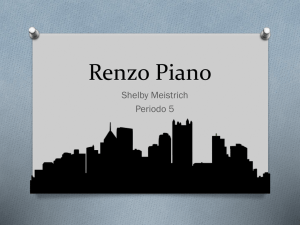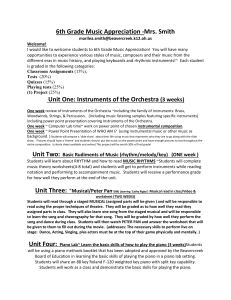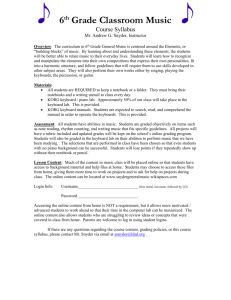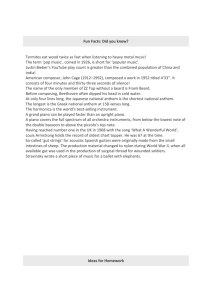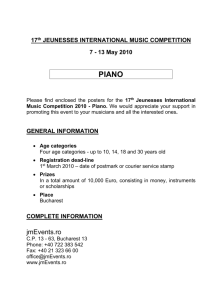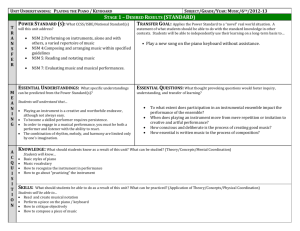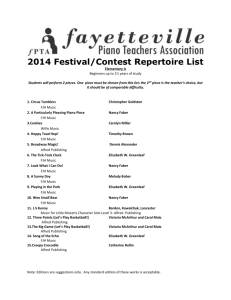BEGINNING INSTRUMENTAL – PIANO – 2014
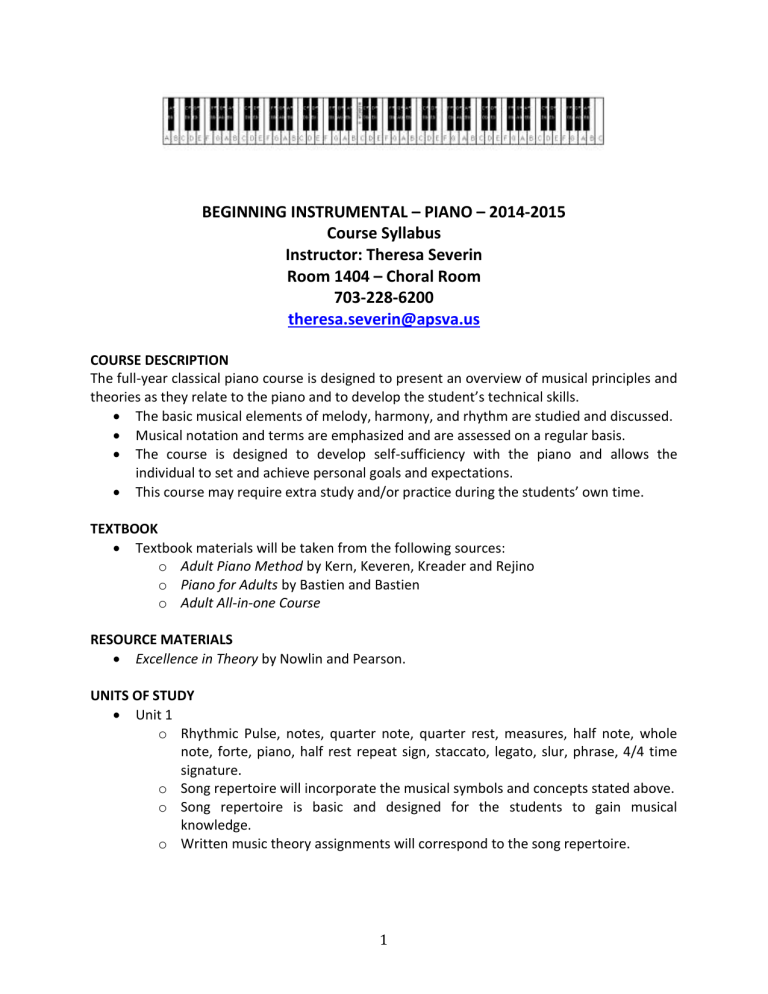
BEGINNING INSTRUMENTAL – PIANO – 2014-2015
Course Syllabus
Instructor: Theresa Severin
Room 1404 – Choral Room
703-228-6200 theresa.severin@apsva.us
COURSE DESCRIPTION
The full-year classical piano course is designed to present an overview of musical principles and theories as they relate to the piano and to develop the student’s technical skills.
The basic musical elements of melody, harmony, and rhythm are studied and discussed.
Musical notation and terms are emphasized and are assessed on a regular basis.
The course is designed to develop self-sufficiency with the piano and allows the individual to set and achieve personal goals and expectations.
This course may require extra study and/or practice during the students’ own time.
TEXTBOOK
Textbook materials will be taken from the following sources: o Adult Piano Method by Kern, Keveren, Kreader and Rejino o Piano for Adults by Bastien and Bastien o Adult All-in-one Course
RESOURCE MATERIALS
Excellence in Theory by Nowlin and Pearson.
UNITS OF STUDY
Unit 1 o Rhythmic Pulse, notes, quarter note, quarter rest, measures, half note, whole note, forte, piano, half rest repeat sign, staccato, legato, slur, phrase, 4/4 time signature. o Song repertoire will incorporate the musical symbols and concepts stated above. o Song repertoire is basic and designed for the students to gain musical knowledge. o Written music theory assignments will correspond to the song repertoire.
1
Unit 2 o Lines and spaces, bass clef, treble clef, the grand staff, two-note slurs, interval, mezzo-piano, mezzo-forte, skips of 3rds, dotted half note, 3/4 time signature, tie. o Song repertoire will use standard notation and will be slightly more difficult. o Written music theory assignments will correspond to the song repertoire.
Unit 3 o Whole rest, dynamic shading, melodic and harmonic intervals, D.C. al fine, interval of a 4 th , fortissimo, pianissimo, flat, accent, 8va, 15ma, sharp, natural, fermata, interval of a 5 th . o Song repertoire is not at the intermediate level. o Written music theory assignments will correspond to the song repertoire.
Unit 4 o Ritard, eighth notes, upbeat, dotted-quarter/eighth note, interval of a 6 th , 8va,
8vb. o Song repertoire will incorporate the musical symbols and concepts stated above. o Written music theory assignments will correspond to the song repertoire.
Unit 5 o Repertoire is now at the medium/advanced level and designed to reinforce all of the musical skill from the entire course.
MATERIALS
Three-Ring Binder. Not a folder.
Pencils
Students are expected to bring all materials to class daily.
You make take your textbook home for homework.
Please remember to bring your book every day. We have very few extra copies.
CLASS PROCEDURES
We will set up the piano equipment following the moment of silence.
Setting up the equipment will begin with the keyboard stand followed by the keyboard itself. Do not attempt to take both at once. After your keyboard is set up, you get your music stand and headphones.
All of your keyboards are operating on battery power, so please make sure that they are turned off every day. Please let me know if your batteries aren’t working and ask me for replacements.
You should have your keyboard set up by 8:30.
We will begin most days with a group exercise and a music theory assignment, followed by individual practice time.
Putting away the equipment will begin at 9:35 in three zones. Zone 1 = keyboards on the floor. Zone 2 = keyboards on the first riser. Zone 3 = keyboards on the top riser.
2
GRADING POLICY
PERFORMANCE PLAYING PROFICIENCIES 30%
Assessment of technical skills, which is a reflection of practice time.
Students may be assessed individually or in small groups.
Students will be assessed using the CD Accompaniments that accompany Adult Piano
Method.
TESTS AND QUIZZES 40%
Regular assessments of student learning and understanding of music theory concepts, notation, and terms will occur in a written format.
Playing tests and Quizzes.
HOMEWORK/CLASSWORK 15%
Students will regularly be assigned homework to ensure mastery of the subject matter.
DAILY PARTICIPATION 15%
This is a participatory class and every student must actively participate throughout the class.
Each student receives 3 points daily based on his/her active participation.
Tardy to class will result in the loss of 1 point and unexcused absences result in the loss of all daily points.
Points will be deducted for improper care of the assigned equipment.
GRADING SCALE
Letter Grade
GRADING SCALE
Percentages AP & IB Quality Points
A
B+
B
C+
C
D+
D
E
90, 91, 92, 93, 94, 95, 96, 97, 98, 99, 100
87, 88, 89
80, 81, 82, 83, 84, 85, 86
77, 78, 79
70, 71, 72, 73, 74, 75, 76
67, 68, 69
60, 61, 62, 63, 64, 65, 66
0 – 59
Quality
Points
4.0
3.5
3.0
2.5
2.0
1.5
1.0
0.0
5.0
4.5
4.0
3.5
3.0
2.5
2.0
0.0 o “Student grades reflect student achievement and not student behavior.” o “quarterly grades will round up when the percentage is .5 or higher” o “In addition to achievement, work habits as noted in the report card comments will be evaluated for each course using the following symbols:
X - Surpasses Expectations
Y
Z
-
-
Meets Expectations
Approaching Expectations
N - Needs Improvement” o “The final grade is required to be calculated using the quality points and not percentages, letter grades, number or point systems”
3
CLASS EXPECTATIONS
It is expected that all students will adhere to the guidelines of the Washington-Lee Student
Handbook.
In addition, the following standards are in place to help our class achieve its goals.
1.
Start each class on time by setting up equipment and materials in a safe and orderly manner. a.
See school tardy and absence policy in student handbook.
2.
Use appropriate and positive school language. a.
No put downs, mocking or bad language or profanity, etc. b.
Replace negative language with positive language that will encourage fellow
classmates.
3.
Come to class prepared will all materials ready to learn. a.
Be responsible for your own materials. b.
Be helpful to other students when setting up or putting away equipment.
4.
Have an attitude of respect at all times. a.
Treat others the way the way you want to be treated. b.
Respect others, their property, and the ‘piano lab’
5.
Adhere to the KEYBOARD LAB POLICY. a.
Practice with headphones plugged in and keep speaker volume low. b.
No horseplay or throwing of items. c.
Do not pound, strike or hit keys. They are made of plastic, after all. d.
Do not alter the appearance of the keyboards, desks, or headphones in any way. e.
Notify Ms. Severin immediately if anything is missing or not working.
FINAL EXAM
Your final exam will count as 20% of your end-of-year grade.
Quarter 1
Quarter 2
20%
20%
Quarter 3
Quarter 4
Final Exam
20%
20%
20%
HALL PASSES
A pass to the restroom, offices, etc., is a privilege, not a right. Your best behavior and positive attitude will give you that privilege.
The hall pass is located at the front of the class by the sound closet. Before you sign the pass out, you must ask. It’s not automatic.
Passes for the clinic, guidance, and library must be hand written by Ms. Severin.
4
STUDENT/PARENT ACKNOWLEDGEMENT
By signing this contract I am stating that I have read through the Beginning Piano Class Syllabus and understand the policies and procedures listed. I assume all responsibility for my actions, and will follow the classroom behavior plan as outlined.
Student Signature
Date
By signing the contract I am stating that I have read through the Beginning Piano Class Syllabus with by student and understand the policies, procedures and expectations stated. I will support my student in keeping his/her responsibility to the class.
Parent/Guardian Signature
Date
Home Phone
Work or Cell Phone
5
